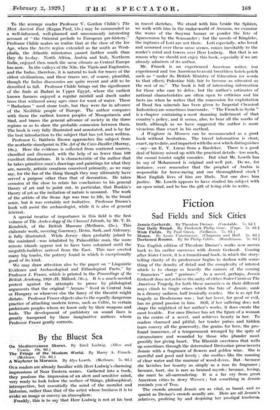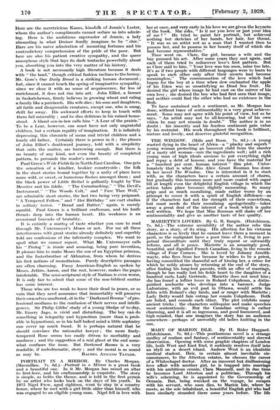Fiction
Sad Fields and Sick Cities
THE English edition of Theodore Dreiser's works now moves back to his earlier successes with Jennie Gerhardt. Coming after Sister Carrie, it is a transitional book, in which the story-
telling clarity of its predecessor begins to darken with some- thing of the density of detail and the complexity of interest which is to charge so heavily the careers of the coming " financiers " and " geniuses." As a novel, perhaps, Jennie Gerhardt does not achieve the unity of either Sister Carrie or The American Tragedy, for both these narratives in their different ways climb to tragic crises which the fate of Jennie, sunk in a dreamy sadness, half ironically evades. She is as apt for tragedy as Desdemona was ; but her lover, for good or evil, has no grand passion in him. Still, if her suffering does not shape the mightiest of her author's works, it does create the most lovable. For once Dreiser has set the figure of a woman in the centre of a novel, and achieves beauty in her. To readers charmed and pitiful, her tender pulses and hidden tears convey all the generosity, the genius for love, the pro- found innocence, of a temperament wronged by the spite of circumstance and wounded by those who plunder most greedily her giving heart. The Rhenish sweetness that wells up sometimes through the determined Dreiserian prose invests Jennie with a fragrance of flowers and golden wine. She is merciful and good and lovely ; she soothes like the running of clear water and the murmur of wood-doves. But—because she lavishes her bounty as simply as a rose its fragrance ; because, hurt, she is rare as bruised myrrh ; because, loving, she must be all-surrendering. It is a far cry from great American cities to dewy Wessex ; but something in Jennie reminds you of Tess.
The crowds around Jennie are as vital, as banal, and as quaint as Dreiser's crowds usually are. Here are all Jennie's relatives, profiting by and despising her prodigal kindness. Here are the meretricious Kanes, kinsfolk of Jennie's Lester, whom the author's compliments cannot seduce us into admir- ing. Here is the ambitious superseder of Jennie, a lady abounding in what Dreiser fondly imagines Jo ", chic."
Here are his naive admiration of mounting fortunes and his contradictory comprehension of the pride of the poor. But here are also his patient creative sympathy, and the queer amorphous style that lays its dark tentacles powerfully about you, absorbing you into the very matter of his history.
A book is not necessarily high literature because it deals with " the land," though critical fashion inclines to the heresy. Mr. Gore's Our Daily Bread is a striking human document ; but, since it cannot touch the spring of imaginative sympathy,
since we close it with no sense of acquiescence, far less of enrichment, it does not rise into art. John Elliot, a farmer
in Saskatchewan, firmly believes in growing wheat and ruling a family like a patriarch. His wife dies ; his sons and daughters, all futile and disagreeable creatures, except one, who is smug, drift far away. His awkward efforts to keep in touch with them fail miserably ; and he dies delirious in his ruined home-
stead. A bland son-in-law calls him " A Lear of the prairie." To be a Lear, however, one must have not only ungrateful children, but a certain regality of imagination. It is infinitely
depressing, this chronicle of mean and trivial children and a lonely old father. Certainly there is power in, it ; the phases of John Elliot's deathward journey, told with a simplicity
that suits the matter, are harrowing enough. But there is no beauty of any kind, not even the beauty of completed pattern, to persuade the reader's assent.
Paul Greens Wide Fields lie in North-East Carolina. One gets the sensation of a kindlier, boskier countryside ; the folk in the short stories bound together by a unity of place have some wild, or sweet, or humorous flashes amongst theta ; and the black power of Little Bethel is gallantly fought by Tim Messiter and his fiddle. " The Cornshucking," " The Devil's
Instrument," " The Woods Colt," and " Fare Thee Well," are admirable short stories, the last two being very poignant. " A Tempered Fellow," and " Her Birthday " are curt studies in solitary terror. " Bread and Butter," again, is merely squalid. Paul Green is a brilliant craftsman, and his knife thrusts deep into the human heart. His weakness is an occasional bravado of brutality.
It is entirely a mattc,f of taste whether you care to .read through Mr. Untermeyer's Moses or not. For me all these interferences with great stories already definitely and superbly told are confessions of the inferiority complex. We want to spoil what we cannot repeat. What Mr. Untermeyer calls his " Prolog " is ironic and amusing, being pure invention.
It pleases him to make Moses the son of an Egyptian princess, and the fosterbrother , of Akhnaton, from whom he derives his first notions of monotheism. Purely descriptive passages are often charming. Fussy American-English as spoken by Moses, Jethro, Aaron, and the rest, however, makes the pages intolerable. The semi-scriptural style of Nathan is even worse, It is only fair to admit that some of the non-biblical matter has sonic interest.
Those who are too weak to leave their dead in peace, or so vain that they need assurance that immortality will preserve their own selves unaltered, sit in the " Darkened Rooms " of Pro-
fessional mediums to the confusion of their nerves and intelli- gences. Sir Philip Gibbs' study of a young Sludge of tn-day, Mr. Emery Jago, is vivid and disturbing. The boy can do something in telepathy and hypnotism (more than is prob- able in hypnotism), so in his half-baked mind a little sophistry
can cover up much fraud. It is perhaps natural that he should convince the rationalist lawyer ; the more finely-
tempered Rose seems too easily driven to morbidity and madness ; and the suggestion of a real ghost at the end some- what confuses the issue. But Darkened Rooms is a very readable, if melodramatic, story ; and the moral is as sound









































 Previous page
Previous page